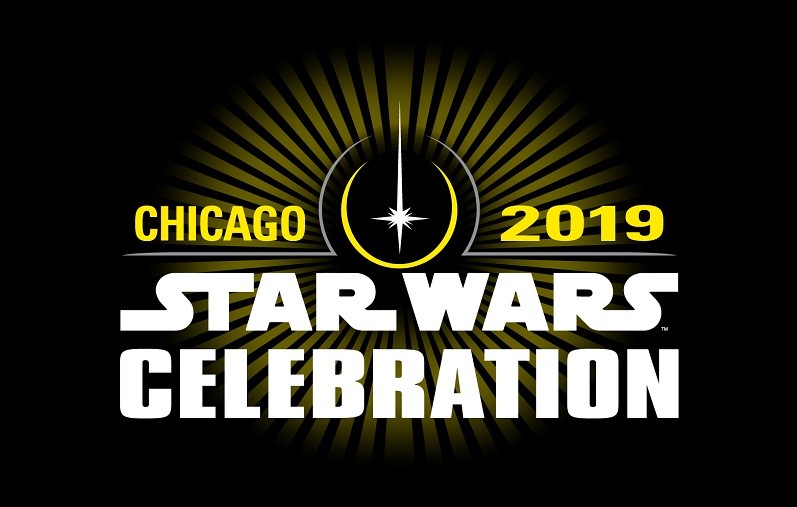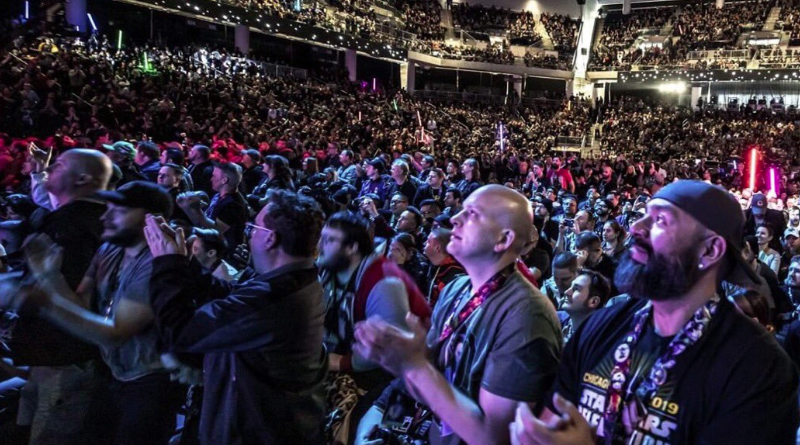Star Wars Celebration Chicago 2019: Logistical Problems and Areas for Improvement
 Although Star Wars Celebration Chicago was a great experience in many ways, including some outstanding panels and the communal experience of celebrating the franchise with tens of thousands of fellow fans, the convention suffered several significant logistical problems before and during the event. These difficulties created needless anxiety and disappointment for many attendees, especially because the organizers should have been able to readily anticipate them well in advance of the convention. Moreover, the situations were compounded by poor communication from ReedPop and Lucasfilm regarding the problems and their resolutions. Hopefully the organizers of the upcoming Celebration Anaheim 2020 will learn from these difficulties and prevent a recurrence, in both problems and communication, at the next convention.
Although Star Wars Celebration Chicago was a great experience in many ways, including some outstanding panels and the communal experience of celebrating the franchise with tens of thousands of fellow fans, the convention suffered several significant logistical problems before and during the event. These difficulties created needless anxiety and disappointment for many attendees, especially because the organizers should have been able to readily anticipate them well in advance of the convention. Moreover, the situations were compounded by poor communication from ReedPop and Lucasfilm regarding the problems and their resolutions. Hopefully the organizers of the upcoming Celebration Anaheim 2020 will learn from these difficulties and prevent a recurrence, in both problems and communication, at the next convention.
The largest disruptions arose from the implementation of a lottery system for seating in the four morning panels with the biggest expected attendance. Due to preexisting city and venue policies prohibiting overnight queueing at McCormick Place or Wintrust Arena, it would have been known to the organizers that the system used at many previous Celebration conventions could not be repeated in Chicago, although the process of handing out wristbands used at Celebration London would have been viable. Nevertheless, the lottery system was announced in mid-March, long after many fans had paid for non-refundable airfares or hotel deposits; the convention badges carried contractual terms stating they were non-refundable and non-transferable. Accordingly, fans who had sunk large amounts of funds into a Celebration trip in anticipation of willingness to participate in overnight queueing to maximize their chances for the Episode IX panel or other high-interest panels now found themselves facing the prospect of having no control over whether they could see the panel. And in fact some fans, including those who flew to Chicago internationally, ended up getting lottery access to none of the four major morning panels – not even one. Given the longstanding practice at previous Celebrations, this substantial change in policy should have been made with much longer advance notice, to enable all fans to decide whether they still wished to invest the time and money in the convention under the new major-panel lottery system.
Even beyond the switch to a lottery system for the four major morning panels, the logistical implementation of the lottery was deeply flawed – and was changed in multiple ways between its announcement and its results. In the initial FAQ describing the panel lottery, fans were told to enter the lottery between March 27 and April 5 by activating their Celebration badge, either on ReedPop’s Celebration website or in the official Celebration app (which was not yet available), so that the lottery wins could be linked directly to the badge to ensure they were personal and non-transferable. But fans immediately noted two huge – and easily anticipated – problems with this system. First, fans picking up their badges at Will Call would be unable to activate a badge prior to the convention to participate in the lottery. Second, with each badge order entering the lottery individually, fans had no way to participate in the lottery with friends who bought badges separately, creating the prospect of winning the lottery only to have to sit among complete strangers – an especially daunting prospect for young women and other vulnerable persons who can face harassment and discrimination at large conventions.
Facing backlash over these issues, the convention organizers hastily rushed out resolutions to them. The lottery was revised to enable entry with an email address associated with a badge order, rather than the QR code from the badge itself, to deliver lottery wins by email rather than through the app alone – but this compromised the ability to associate lottery entries in a non-transferable manner. The lottery process also was amended to enable fans to enter together in groups of up to six people – but this solution still did not allow multiple badges from the same order to participate in different groups, forcing some fans to either join a less-preferred group or not enter the lottery at all. In the course of carrying out these last-minute changes to the lottery, the organizers were forced to extend the lottery deadline from April 5 to April 8. Instead of knowing the lottery results at the end of the prior week, some fans literally began their travels to the convention without knowing which major panels, if any, they would get to attend.
As the convention began, these problems compounded. Although it had been originally announced that lottery winners would be given a time to arrive for entry to the Wintrust Arena, neither the confirmation email nor the Celebration app provided such information. This resulted in confusion about arrival time, and many fans showed up later than was necessary given the requirement to scan each person’s QR code before entry. Consequently, the arena was roughly 75% full fifteen minutes prior to the start of the flagship Episode IX panel on Friday morning. Realizing they were falling behind, staff began to let people into the arena without checking the codes, resulting in individuals who had not won the lottery managing to make it in the arena. Staff did not appear to be regularly scanning QR codes at entry or enforcing seating section assignments at the other morning Wintrust Arena panels, either, further demonstrating the disconnect between what the organizers thought they could do and what they could actually implement given the infrastructure they had available.
These difficulties with the lottery system warrant careful consideration by the organizers of Celebration Anaheim 2020. Importantly, many fans viewed the lottery system positively: it allowed fans who are unable to endure the toll of overnight queueing to have a chance to attend the biggest panels – something the previous system had denied them. Perhaps the next convention could use a mix of the two systems, allocating some seats by lottery and others by queueing, similar to the FastPass and standby queues used at the Disney Parks. Regardless, whatever system is adopted must be determined well in advance so that sufficient infrastructure can be put in place – and it must be announced well in advance of the convention, too, to give all attendees a fair opportunity to decide if they wish to spend the money to attend on those terms.
In addition, the organizers must take steps – and prominently publicize them – to avoid the unintended consequences of the Celebration Chicago system. With the QR codes for panel lottery wins delivered by email instead of linked in the app, winning entries were listed on Ebay for hundreds of dollars each, especially for the Episode IX panel in the Wintrust Arena. It is unclear how many of these codes actually were bought and used, but it did not appear during the convention that the panel-entry staff had any meaningful way to ensure that the person using a QR code was the original recipient of it. On some occasions, panel-entry staff did not even scan the QR codes denoting lottery wins to verify their applicability to the particular panel, but simply visually confirmed the presence of a code on a device. Without measures clearly and firmly in place to ensure the non-transferability of a lottery win and the validity of the QR code used for panel entry, the secondary market for lottery wins will only get worse next time.
Similarly, fans anticipating a repeat of the Celebration Chicago system might purchase multiple badges for each attendee simply in the hopes of having additional panel lottery entries. This would have serious negative effects on the financial structure of the convention for its organizers and vendors, as it would greatly reduce the average per-badge expenditure at the convention. It would also deprive numerous fans of the opportunity to attend the convention at all, as badges overall would sell out faster while reducing the total attendance. Accordingly, it is imperative that the organizers of Celebration Anaheim 2020 make clear that only one purchased badge per individual is permitted, and cancel all badges of anyone discovered to have exceeded that purchase limit. San Diego Comic-Con, for example, enforces a one badge per person rule, including a financial penalty on those caught obtaining duplicate badges.
Another problem was highlighted by the merchandise exclusives lotteries involving Hasbro, Funko, and Lego. Messaging about the lottery did not make clear whether fans would be allowed one entry per individual for the convention, or one entry per badge. For example, fans expressed concern that a person with one Saturday and one Sunday badge would get two merchandise lottery entries, while a different person with a five-day badge would get only one entry despite attending for all five days. The confusion was exacerbated when some fans reported receiving merchandise lottery wins to be redeemed on a day for which they did not hold a single-day badge, implying that the lottery system was not coded correctly to associate badges held with lottery entries. To ensure fairness to everyone, the policy should be consistent: either one entry per person per day, or one entry per person for the convention as a whole, irrespective of the badge(s) used. If this policy is not adopted and publicized prior to the convention, however, then fans who prioritize the acquisition of merchandise will have a tremendous incentive to purchase five single-day badges for each day of the convention rather than a five-day badge. Alternatively, switching entirely to single-day badges, as some conventions do, would avoid this situation – for both merchandise and panel lotteries.
The Celebration Chicago app was promoted heavily in the weeks leading up to the convention, but it too suffered from a number of problems. At least on Android, the app routinely crashed during use. Updates to the app were not pushed out at the same time on all devices, sometimes resulting in friends being unable to use a feature at the same time because it was updated and active on some devices but not others. Although some fans were able to link their badges to the app, other fans reported problem doing so, or were never able to successfully do so. Without a linked badge, features such as the Lightspeed Lane panel reservations were not useable. Even fans with an activated badge experienced problems making Lightspeed reservations, however, including seeing reservations made, then disappear, then reappear in the app. Other fans could not get the feature to work at all until after key panels had already filled. If Celebration Anaheim 2020 intends to rely on an app for significant show features, much greater reliability and consistency is necessary for the next iteration.
The Lightspeed Lane experienced problems in its implementation, as well. No “lanes” were marked, and fans had to ask staff repeatedly where to go. Ultimately, fans discovered that redeeming a Lightspeed Lane panel reservation it involved entering the queue room through the regular entrance, then bypassing throngs gathered in the main queue chutes and entering directly into the panel room. As with the Wintrust Arena, staff did not regularly scan QR codes, but merely visually confirmed the presence of one displayed on a device. The fundamental defects in the design of the lottery and Lightspeed Lane systems indicate a failure to understand the interests and behaviors of the end users, the level of coding necessary to making the app and lottery work, and the need to clearly delineate a process and timetable for efficiently and timely loading panel rooms. Process problems such as these cannot be correct on site at the convention – by then it is too late. Gathering input from fans with professional experience in these areas during the initial stages of planning the convention would have identified these issues in plenty of time to address them in advance.
Another aspect of the Celebration Chicago rollout is worth mentioning, as well. A few weeks before the convention, ReedPop announced a partnership with Lyte to allow fans to resell Celebration tickets they had become unable to use. Functionally, however, Lyte operates as a refund system: a badge holder signs up to resell their badge, Lyte offers the badge to the person at the top of the waiting list, and when that person purchases the badge the original holder is refunded their purchase price (minus a fee to Lyte). This is highly beneficial to fans who become unable to attend the convention, regardless of the reason – but the system fails to understand the nature of the Star Wars fandom. Most fans who become unable to attend do not simply desire a refund on their badge purchase; instead, they wish to sell their badge to a friend or acquaintance who missed out on the original purchase window (perhaps because they did not have the funds available before badges sold out) but now is ready and able to attend. And in fact, prior to the Lyte option fans had been undertaking such transfers of badges on their own initiative. Unless Lyte offers a peer-to-peer resale feature, such off-market sales will continue in the Star Wars fan community for future Celebration conventions.
Finally, the organizers of Celebration Anaheim 2020 need to make significant improvements in the communication of important information about the convention. Some of the crucial updates on the panel lotteries and subsequent changes were pushed out primarily on Twitter. Many fans attending Celebrations, however, are not active on social media. In addition, clarifications sometimes came from the personal Twitter accounts of key organizers, rather than the official Celebration or Star Wars accounts, making it even more challenging for less social media attuned fans to receive the information. The Celebration email newsletter contained the updates, but often only in the body of the email. A fan not interested in The Mandalorian panel or Hayden Christensen’s autographing, for example, might not bother to open and fully read an email with that subject line – and consequently not see information about panel lotteries, entry procedures, or other updates. While convention attendees share some responsibility for keeping an eye out for important communications, it is important for Celebration’s organizers to develop and maintain a consistent and clear communication strategy for disseminating the key updates and information in a manner that reaches as many attendees as possible.
No doubt the organizers of Celebration Anaheim 2020 will revisit the pros and cons of Celebration Anaheim 2015 in planning for the next convention. The pluses and minuses of Celebration Chicago 2019 also are worth reviewing carefully and thoughtfully, in the interests of making the next Celebration as smoothly run as possible.










